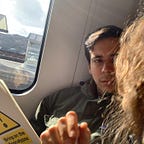How to be more creative
I’ve been working as a designer for close to five years now. Unlike some of my peers, I got into design through psychology and not through other creative disciplines like graphic design or architecture (my door into it was research). I consider myself to be artistically inclined in the sense that I enjoy the arts, but I abandoned any pretension of doing art myself decades ago.
It’s not surprising that I feel a bit inadequate every once in a while, wishing that I could’ve done something in the past to improve my creative output today. I don’t think you can ever be late to “learn” to be more creative, and through personal experience and research I set down three guidelines that have helped me achieve this. I hope these suggestions help someone else feel more creative, too.
One: Always think of yourself as a beginner
“In the beginner’s mind there are many possibilities, but in the expert’s mind there are few.”
Shunryu Suzuki
Think back to a time you tried to learn something. If you were really motivated to learn, you knew you couldn’t be too concerned about your shortcomings or failures. That freedom from fear we experienced wants to be replicated everywhere creative work is involved. But most of the time “failing fast” and other maxims are just lip service; nobody really wants to think of themselves as beginners and for a very good reason: failing like a beginner and being a beginner looks a lot alike to someone else.
To survive being a beginner in perpetuity you have to convince yourself you’re one while everyone else believes in your mastery. In this sense, I think an apt comparison is with Buddhist monks, who exude humility and mastery at the same time. The problem is that, as you acquire knowledge, it gets harder and harder to think of yourself as a beginner. In other words, to always think of yourself as a beginner takes a lot more effort than to be an expert. (And maybe that’s another reason why you should be one.)
Two: Don’t think of ideas as dead-ends
“In proportion as it acquires new ideas, the mind simultaneously acquires fresh instruments for pursuing its inquiries further.”
Baruch Spinoza
Again, let’s take a walk down memory lane and think of our time in school: why were we taught algebra before geometry? Through algebra, we learned about symbols and structures, and ideas like addition, subtraction, multiplication, and division, which are very useful in themselves. But these ideas were also the tools that we needed to understand other maths, like geometry. What we learned in algebra weren’t just dead-ends: they were the means we needed to acquire further knowledge. Likewise, when it comes to creativity, every idea should be seen as a means for generating other ideas and not just as dead-ends.
It’s often said that a good designer is someone who crosses the T: a thorough knowledge of Design plus a myriad of different interests where he or she can get ideas from. Divergent ideas generate divergent thinking and we end up finding solutions to problems in places where we least expect them. Your knowledge of chess, mycology, or modern dance adds tools to your mental toolbox that might come in handy someday.
Three: Be a node and look for networks
“To think independently of other human beings is impossible. Everything you think is a response to what someone else has thought and said.”
Alan Jacobs
Jean-Luc Godard is one of my favourite filmmakers. Through his work made across six decades, he changed cinema forever. But Godard wasn’t alone: he belonged to a thriving scene of post-war French filmmakers and critics (what would later be called La Nouvelle Vague, the New Wave). It wasn’t just Godard, but Truffaut, Varda, Rohmer, Rivette, Melville, Demy, etc that revolutionized cinema. Though they belonged to the same movement, each one developed his or her own style.
Brian Eno calls this a “scenius”, a portmanteau of “scene” plus “genius”. And a scenius is how we come up with new ideas (since lone geniuses don’t exist): we develop our thinking through conversations and discussions with others. In this way, creativity is dialectically constructed: the more you exchange ideas with your group, the more developed they become. So you should be asking yourself: who am I discussing my ideas with? Who belongs to my scenery?
Creativity is one of the abstract functions that philosopher Michael Polanyi suggested are tacit knowledge: things we learn almost unconsciously that are hard to communicate to others. In this way, creativity is often hard to pinpoint and thus to talk about, but following these three guidelines has made me a more creative person. Again, I hope these suggestions help someone else feel more creative, too.
